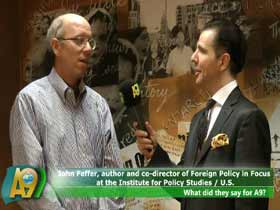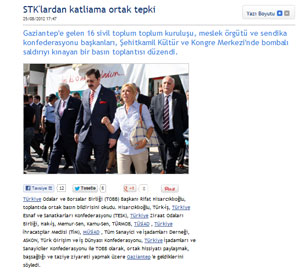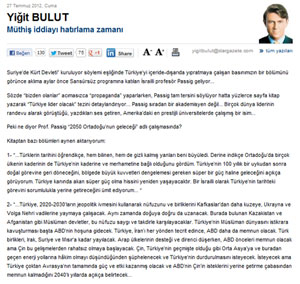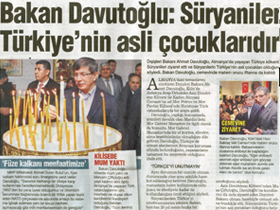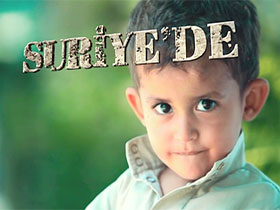Bigotry: The Dark Danger
New era dawns on Turkey

The recently concluded general elections proved to be a major turning point in the Turkish political history. The Justice and Development Party or AK party, which had been ruling the roost for the past 13 years once again emerged victorious with one difference — for the first time in 13 years it lost majority in the Parliament.
This means that Turkey will have a coalition government after over a decade. Coalition governments in Turkey have always been marked by political instability; therefore, one could say that the people in Turkey are not very fond of such a setup.
However, it would be more accurate to ascribe the instability of coalitions, not to their nature per se, but to the errors in the predominant mindset in the country — democratic weaknesses and the influence of the secret state apparatus. These 13 years of stability in Turkey changed many things in that sense. The influence of the secret state apparatus came to an end and Turkey realized it was sufficiently mature and strong as a state to survive on its own. There could now be no going back. It is time for Turkey to move ahead.
The main reason for the AK party’s loss, as the public opinion polls show, was the talk of the presidential system. The insistence on demanding a US-type system of governance created serious public concern. The presidential system inevitably leads to federation. And while federation may not represent a problem for different countries in different regions, it is not considered good for Turkey because in the southeast of Turkey is the PKK, a communist terror organization that has been awaiting federation for the last 40 years. Having failed to break Turkey up with terror attacks, the organization is now trying to achieve it through other means and has long been striving for autonomy.
It plays the Kurdish cards despite having no interest in Kurdish nationalism and oppresses the Kurdish people living in the area. The aim of this organization is to enter the Turkish Parliament in the form of a legal party and dominate the southeast through an illegal state structure. If the Turkish republic were divided up into federations, the PKK, which dominates the region through pressure and threats, would almost have achieved its aim. That fact caused the Turkish people to panic and to exhibit no tolerance for talk of a presidential system. The only way of obstructing Erdogan’s insistence on a presidential system was to vote for the HDP, the party best suited to crossing the 10 percent threshold.
The problem is that despite all its liberal views, the importance it attaches to women’s rights and moderate policies, the HDP is backed by the PKK. Party members and leaders are also threatened by the PKK, and it — willingly or otherwise — stands as a “legal party representing the PKK” in the Parliament behind closed doors. Were it not for the fact that it is backed by the PKK, the party could become an important component of our democracy and enjoyed even greater support. But the backing of the PKK serves only to portray the HDP as a threat.
By the time you read this, a new government in Turkey may already have been formed, or maybe the negotiations will still be continuing. Early election will serve no purpose unless the mentality changes, and the number of votes going to the AK party may decline still further. A minority government is also risky in terms of an opposition majority. It will be exceedingly hard to get decision and bills through the Parliament and the chances of stability will decrease. The most stable path is clearly a coalition. The best candidate is the MHP, a nationalist party determined to make no concessions to the PKK. It is essential for the MHP to be part of the government and also for it to be given the interior ministry. If that is done, the heavy responsibility incumbent on the AK party due to the peace process will be somewhat lightened and since the PKK is aware of the MHP’s determined stance it will be unable to maintain its dominance in the southeast.
Let us remember that if the PKK grows stronger in the region and lays the foundation for a communist state in parts of Turkey, Syria, Iraq and Iran, that will result in a terrible scourge, not just on Turkey, but on all the Middle East and then the entire world. Turkey must therefore take the threat seriously. The West is only now coming to understand Turkey’s position, a country that was accused of not helping the PKK over Kobani. An article written by Jamie Dettmer in the Daily Beast titled, “Town the US helped save, now run by terrorists” is a good example of this.
Dettmer explicitly wrote that it was not in fact Kurdish fighters who were helped by the coalition forces in Kobani, but PKK terrorists who oppress their own people.
It is essential that a new government to be installed in Turkey attend to this threat. We need a government that stands against division, lifts the PKK pressure on the Kurds in the southeast and even on the HDP and completely eliminates the communist terror threat from the region and the country. What we need are parties that support one another for the sake of the country as a whole, rather than fighting among themselves. Coalition traditions must be cast aside, recriminations must be forgotten and a strong alliance that ensures greater stability in the Middle East should be established. That is what Turkey, and also the Middle East so drenched in blood need.
1. http://www.thedailybeast.com/articles/2015/06/02/town-the-u-s-helped-save-now-run-by-terrorists.html
Adnan Oktar's piece on Arab News:
http://www.arabnews.com/columns/news/761126


